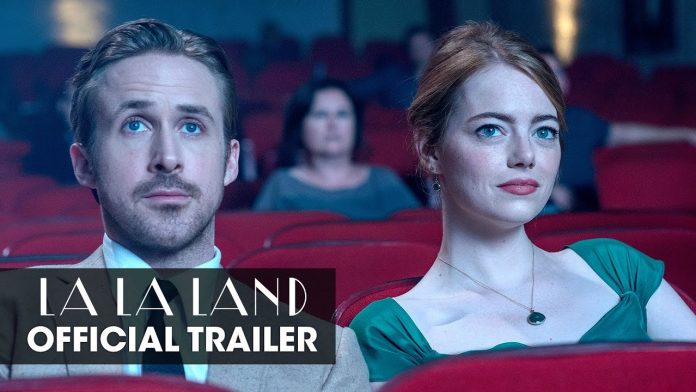RYAN Gosling and Emma Stone reunite for the third time with Whiplash director Damien Chazelle at the helm in La La Land, a musical piece that has its share of heart but not to the point of consistent enjoyment unfortunately.
After kicking off with a dance number done in long take on a highway, we meet jazz pianist Sebastien (Gosling) and wannabe actress Mia (Stone) whose first two encounters are met with rude awkwardness to say the absolute least.
As the seasons progress, they encounter each other again where they gradually fall in love and continue to follow their respective passions, often done so through the art of dance and singing, whether solo or together.
Sebastien insists on following his ambition to open a bar devoted to his passion despite the belief to others that jazz is dead, whilst Mia mixes her job at a coffee shop on the studio lot with attending unsuccessful auditions one after the other.
But as opportunities arise that offer each a chance to make it, the relationship finds itself being tested as the pressures of making it set in with no guarantee of a long-lasting career in the cutthroat industries ensured.
Following from Whiplash, Chazelle has used his advantage of making a critically successful work by securing the trust to make this homage to the golden age of Hollywood, recruiting the talents of Gosling and Stone for it. On paper it sounds like a good idea, but the whole point of this film is for the viewer to feel transfixed, with its opening piece meant to kickstart that. To be blunt, it doesn’t and though there are moments of likability, those are outweighed by the lack of anything miraculous taking place, a real shame given the reputation this film has quickly developed.
To start with, if Chazelle is trying to pay tribute to the musicals of the 1950s, all he has succeeded in doing is remind people why nobody will ever come close to them. One can easily contrast the mood the opening sequences creates with the likes of Singin’ in the Rain and The Band Wagon. Those are fine examples of why the musical genre suited the 1950s because nobody could better the likes of Astaire and Kelly, something which the dancers of this film have a nerve if they think there could be such a comparison.
The other dance numbers are not of particular fascination either, with Sebastien and Mia’s flirtations turning into a dance piece overlooking LA just one example of not quite screaming out enchanting. If this is seen as a homage to a time Hollywood worked at its best, the end result is not a hugely impressive one.
The film for the most part relies heavily on the two leads, and even though it’s not enough to save the film, its third time the charm in displaying a chemistry made of conviction, having done so in Crazy Stupid Love and Gangster Squad.
Gosling and Stone do well with their singing, specifically the former’s solo rendition of City of Stars on a pier. He also brings to mind Adrien Brody in The Pianist and Geoffrey Rush in Shine with his ability to play the piano (he didn’t require a piano double), a feat that contributed to them winning Oscars in the past. Whether Gosling is worthy of a victory time will tell after observing other performers but for commitment and drive, he is a worthy nominee.
Stone is the best performer of the two, capable of making us viewers want to reach out and comfort her as she goes through the seemingly endlessness notion of being ignored at auditions and effectively shooed out after saying just one line.
One scene in particular involving Mia almost certainly testifies to that point as one gets a close-up view of humiliation that emphasises kicking a person when down. Sebastien gets a taste of that earlier when he defies his reluctant employer’s request to stick to Christmas songs at a restaurant, delivering an impressive jazz piece to no applause and the words ‘‘You’re fired’’.
Of course, the film works better as a drama depicting the struggles that both characters go through, but it’s not that good a drama either. The script often comes across as basic, not coming up with any quotable lines and not delivering the segment that would help improve the work as it continues. There are moments that feel inevitable, especially in regards to one pivotal scene between the two and one does not know whether it’s acceptable giving its clichéd elements.
The film never really seems to craft a level of high engagement levels, crucial for a musical and also for a film that its headlined by the two leads in the world of Hollywood. Corniness is not really wanted and there are times when it feels like it is there in all its unwanted glory.
It is safe to say that this is the frontrunner for the Best Picture Oscar and one has a concern that for the first time this decade, we are about to see a disappointment win the top prize come February 26. Its cinematography is worthy and it wouldn’t be disheartening to see Stone walk away with Best Actress, but the result is something that represents what is wrong with Hollywood today. It is an example of a film trying to be something it is not, representing where today’s directors and writers are going wrong and proving how much those creative minds contrast with those of yester-century.
***




























